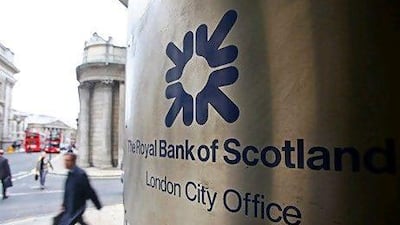Many in the British banking and financial industry will feel they have been in the trenches for the past four years.
Finance:
Industry Insights Exclusives you can bank on from The National's premium content. Learn More
Those still clinging on - and many are not - have survived the Northern Rock crisis, the collapse of Lehman Brothers, the Greek restructuring and the euro-zone's continuing debt crisis.
But most commentators agree that this year will be another challenging period, particularly in the first few months.
Goldman Sachs, for one, has cut its exposure to banks and financial services, and the consensus is that private investors should follow suit, despite the low valuations in the sector.
Other bears of the banking sector include Ted Scott, the director of UK strategy at the fund manager F&C, who says "the risk is that European bank equity holders could be left with very little".
Terry Smith, the chief executive of the interdealer broker Tullet Prebon, is even more bearish and predicts banks across Europe could be nationalised if, or rather when, he argues, Greece leaves the euro.
Angela Knight, the chief executive of the British Banking Association, the industry's primary lobbying body, agrees that instability in the euro zone is now the primary threat to the British banking industry.
"How far the turmoil runs depends on whether the politicians implement their frequently announced proposals and whether the markets consider the actions believable," she says.
"In the UK, the banking industry has collectively done more to improve the stability of banks than most of our international competitors. We are determined to work to deserve the trust of our customers," she says.
European Central Bank stress tests applied just before Christmasshowed the UK's banks to be in much ruder health than their continental counterparts. The tests required a number of European banks to bolster their balance sheets to the tune of €115 billion (Dh537.35bn) in total by the end of June, but not a single British lender was required to strengthen its capital base.
The big question the UK's commercial banks have faced during the past 18 months has been how to reconcile two conflicting demands made of them. The first is that they build up their capital reserves to ensure they do not run into the same difficulties that created the 2008 banking crisis. The second imperative is that they lend more to small and medium enterprises (SMEs).
The banks came close to hitting their lending targets, although many SME customers were more interested in paying down existing debts, but the pressure on the banks remains.
Howard Wheeldon, a senior strategist at BGC Partners, points out the increased regulatory demands banks are facing will inevitably have an impact on their liquidity and can only limit what they can do over the coming two years.
Mr Wheeldon does not fear a large bank failure but believes the squeeze of new regulations and tight interbank lending will combine to reduce bank profits dramatically.
"At this stage, we do not have the dreaded Tobin tax, but if this is forced on continental European banks, we can write the prospect of European bank recovery off for a very long while," says Mr Wheeldon.
"If there are to be any winners in terms of ability to take advantage of others' failure, then those banks with well-spread international activity - particularly Middle and Far East - such as Standard Chartered and HSBC, should fare best," he says.
Two of the biggest UK banks remain partly owned by the taxpayer and are consequently heavily constrained in their activities.
Royal Bank of Scotland (RBS), 83 per cent owned by the British taxpayer, is obliged to scale back some of its activities from the fat years of Sir Fred Goodwin. In future it will concentrate on what used to be called retail banking.
Meanwhile, Lloyds Banking Group, 41 per cent state-owned, is busily divesting itself of many assets it acquired as part of the ill-conceived takeover of HBOS. These include some 632 branches the European Commission obliged it to sell on competition grounds.
Lloyds finds itself in a particularly difficult position. Antonio Horta-Osorio, the chief executive, is seen by many in the City of London as something of a lame duck after having taken several months off because of stress.
By contrast, without having received a taxpayer rescue, Barclays is in a far stronger condition. The City remains sceptical that Barclays can hit the return on equity targets set by Bob Diamond, its chief executive, but the bank's investment activities will stand it in good stead when global markets pick up.
Britain's other two major listed banks, Standard Chartered and HSBC, seem destined to spend most of this year fending off questions from shareholders as to why they do not move east, where the economies in Asia are booming.
Standard Chartered has little or no British operations while UK banking accounts for barely 15 per cent of HSBC's global business.
Elsewhere in the City, fund managers will be hoping for better times. Hedge funds reported that returns fell by an average of 4 per cent last year - only the second year since records began that they failed to record a gain.
Perhaps the sector of the City in the best health at the start of this year is the insurance industry.
Prudential has shrugged off the disappointment of its failed bid for AIA to continue growing strongly in Asia, while Aviva continues to build in Europe and Asia and has been bolstered by the arrival of Trevor Matthews, the popular former Friends Provident chief executive. Legal & General and RSA Insurance are also doing well.
The City of London, in short, is in better health than many of its detractors would have you believe.
twitter: Follow and share our breaking business news. Follow us

